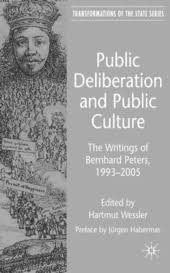Abstract
The notion of the public sphere has come to play an important role in the debate on the European Union’s democratic legitimacy. Particularly since the erosion of the “permissive consensus” and a growing opposition to the EU in the wake of the Maastricht Treaty (see e.g. Niedermayer 1995), the emergence of a communicative infrastructure between the EU and its citizens has become a touchstone for the legitimacy of European governance. Not only has public support for the integration process steadily declined since the beginning of the 1990s, but Eurobarometer surveys also show that Europeans are not sufficiently informed about the EU and often feel alienated from decision-making in Brussels. They tend to see the EU as remote and at the same time too intrusive (European Commission 2001, 3).

Brüggemann, Michael; Sifft, Stefanie; Kleinen-v. Königslöw, Katharina; Peters, Bernhard; Wimmel, Andreas (2008): Segmented Europeanisation. Trends and Patterns in the Transnationalization of Public Spheres in Europe. In Hartmut Wessler (Ed.): Public Deliberation and Public Culture. The Writings of Bernhard Peters. 1993-2005. Basingstoke: Palgrave Macmillan, pp. 196–212.
